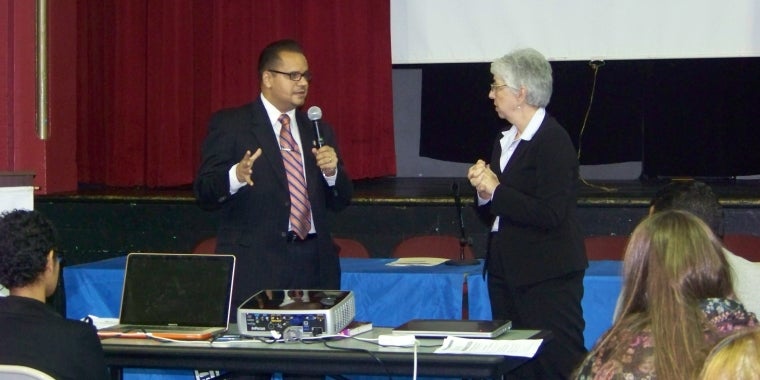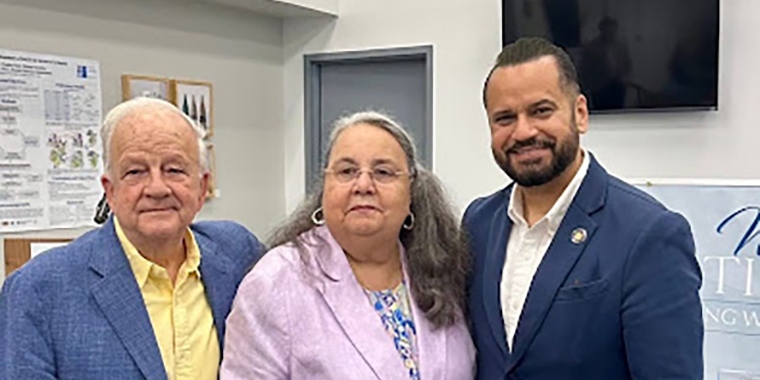
Senator José M. Serrano, Colleagues, and Advocates Stand Up for the Rights of Immigrant Families
José M. Serrano
November 17, 2010
-
ISSUE:
- Immigration

***SCROLL DOWN FOR SPANISH***
FOR IMMEDIATE RELEASE:
Friday, November 17, 2010
Contact:
Serrano Office:
Damaris Olivo | (212) 828-5829 | dolivo.nys@gmail.com
Senator José M. Serrano, Colleagues, and Advocates Stand Up for the Rights of Immigrant Families
Senator José M. Serrano (D-Manhattan/Bronx) , local elected officials, and member organizations of the East Harlem Against Deportation Coalition, including Northern Manhattan Coalition for Immigrant Rights and the Children’s Aid Society, today held an immigration forum on the federal Secure Communities (S-Comm) program.
S-Comm is a program that empowers local jails to cross-check a Department of Homeland Security (DHS) database while booking detainees, providing ICE with a constant technological presence at local police stations and jails. After using the DHS biometric identification system to share the prints, those suspected of being deportable are then transferred into the detention and deportation system. According to a 2009 report by the National Immigration Law Center, enforcement efforts have largely targeted persons accused of minor infractions, like traffic offenses, rather than violent criminals.
The forum began with a presentation by the Northern Manhattan Immigration Coalition on the dangers in the implementation of S-Comm. Local elected officials and immigrant’s rights advocates denounced the program, which could compromise the public safety of New Yorkers by leading to the underreporting of crimes, and by making immigrants an increased target for criminals. There is also a concern that S-Comm could contribute to racial and ethnic profiling, and that it exposes New York State to liability for any lawsuits arising from profiling.
The majority of individuals arrested through S-Comm were initially detained on minor charges. ICE divides individuals with criminal convictions into Level 1, 2, and 3- with Level 1 being the highest priority. However, more than 52 percent of the people deported due to S-Comm between October 2008 and August 2010 were what ICE defines as Levels 2 or 3. An additional 26 percent of the people deported were non-criminals.
Senator Serrano and 11 of his Senate colleagues sent a sign-on letter to Governor Paterson to express concern about the S-Comm program, and to support the request of New York-based organizations to suspend the Memorandum of Agreement signed in May 2010 between the New York State Department of Criminal Justice Services and the Department of Homeland Security’s (DHS) Immigration and Customs Enforcement (ICE) agency.
The suspension of the MOA would allow time for the State of New York and its key constituencies, including law enforcement agencies and community-based organizations, to assess the potential costs and consequences of S-Comm on issues such as community safety, effective policing, civil rights (including the potential of racial profiling), fiscal costs and liabilities, among others.
According to federal officials, S-Comm would “dramatically increase” the number of people held in detention for additional time on civil immigration violations, yet the program provides no additional federal funding to state or local entities for the increased cost, forcing them to absorb the cost of mass incarcerations.
ICE Secure Communities representatives have completed their outreach in the following New York State Counties: Genesee, Orleans, Wayne, Oswego, Onondaga, Oneida Herkimer, Hamilton and Madison. They are scheduled to conduct outreach in Niagara, Monroe, Livingston, Ontario, Yates, Seneca, Cayuga and Wyoming counties in the next few months.
“Secure Communities is an initiative that, if implemented, will have a particularly devastating effect in the communities which I represent,” said Senator Serrano. “We want to ensure that local law enforcement does not get into the business of deportation. The key to safe streets is building trust between residents and police, but you cannot build trust if the local police and jails are required to enforce an unjust immigration system.
“I remain opposed about the entire Secure Communities program,” said Congressman José M. Serrano. “Although it claims to make our communities more secure, in many ways it makes it more difficult to keep our communities safe by making people less likely to come forward and talk to the police. Furthermore, as we have seen in the pilot programs Secure Communities does not in fact focus solely on violent and dangerous criminals, as was promised, but rather reaches everyone the police fingerprint. At the very least, communities with high immigrant populations like our own should be allowed to opt out if they believe that it is in the best interest of their communities, and I applaud the New Yorkers who are standing up and saying no to this policy.”
“The Secure communities program unfairly targets immigrants and members of the East Harlem community, preying on unfounded stereotypes of immigrants. Residents of East Harlem know better. We know that immigrants have been the backbone of this community and this State, and would appreciate $200 million dollars being spent on improving education and creating jobs, instead of targeting hard working law abiding New Yorkers and placing them in the black hole of immigration detention and deportation with almost no opportunities for relief,” said Assembly Member Elect Robert Rodriguez.
"Secure Communities will have serious consequences for our human and civil rights. By requiring police to send fingerprints to the DHS database, this program will make communities view police as immigration agents. There are currently no protections in place to prevent racial profiling, fiscal liabilities, or any other problems with this program. New York needs to stand up for our rights and immediately rescind this agreement with ICE," said Angela Fernandez, Executive Director of the Northern Manhattan Coalition for Immigrant Rights.
“The word is out on the street. We are seeing women very scared to get help because they are afraid of the police and deportation. This increases the danger for everyone, our women, our families, our communities,” said Cecilia Gaston of the Violence Intervention Program, Inc, who gave a presentation on how S-Comm will affect New York’s women.
“The Secure Communities Program goes against the basic dignity of a person, planting the seeds of mistrust between police and their communities, whom they have sworn to protect,” said Father Fabian Arias of the New Sanctuary Movement.
El Senador José M. Serrano, Colegas, y Organizaciones Locales Luchan por los Derechos de Familias Inmigrantes
El Senador José M. Serrano (D-Manhattan/Bronx), oficiales electos, y organizaciones miembros del Barrio Contra la Deportación, incluyendo a La Coalición del Alto Manhattan para los Derechos del Inmigrante y The Children’s Aid Society, hoy llevaron a cabo un foro sobre el programa federal Comunidades Seguras (S-Comm).
S-Comm es un programa que requiere que las cárceles locales compartan información con el Departamento de Seguridad Nacional de los EE. UU. Después de ser detenidos localmente, aquellos que son sospechosos de ser deportables son trasladados al sistema de detención y deportación. Un reporte publicado por el National Immigration Law Center en el 2009, dice que la aplicación de la iniciativa se enfoca principalmente en personas que han sido acusadas de infracciones menores, como ofensas de tráfico, y no en criminales violentos.
El foro empezó con una presentación por la Coalición del Alto Manhattan para los Derechos del Inmigrante sobre los peligros que existen en la implementación de S-Comm. Oficiales electos locales y organizaciones de derechos al inmigrante se opusieron al programa, el cual puede comprometer la seguridad de todos los Neoyorquinos al contribuir a los crímenes no-reportados, y al hacer que los inmigrantes sean un blanco fácil para criminales. También existe la preocupación de que S-Comm puede contribuir a la discriminación racial, y que expone al estado de Nueva York a demandas causadas por la discriminación.
La mayor parte de personas que son arrestadas por S-Comm fueron inicialmente detenidas por cargos menores. ICE divide a los individuales condenados criminalmente entre Niveles 1, 2, y 3- con el Nivel 1 siendo la prioridad más alta. Sin embargo, más del 52 por ciento de las personas deportadas por S-Comm entre Octubre 2008 y Agosto 2010 fueron lo que ICE define como niveles 2 y 3. Adicionalmente, un 26 por ciento de las personas deportadas no eran criminales.
El Senador Serrano y once de sus colegas en el Senado enviaron cartas al Gobernador Paterson para expresar preocupación sobre el programa S-Comm, y para apoyar la petición de organizaciones basadas en Nueva York, que pidieron la suspensión del acuerdo firmado en mayo 2010 entre el Departamento de Servicios de Justicia Criminal del Estado de Nueva York y el Departamento de Inmigración (ICE).
La suspensión del acuerdo permitiría tiempo para que el estado de Nueva York y sus distritos claves, incluyendo las agencias policiacas y organizaciones comunitarias, para asesorar los costos y las consecuencias potenciales de S-Comm en asuntos como seguridad, departamentos policiacos efectivos, derechos civiles, y costo fiscal entre otros.
Según oficiales federales, S-Comm aumentaría dramáticamente el número de personas detenidas por tiempo adicional por violaciones de inmigración civiles, pero el programa no provee fondos federales adicionales para entidades locales y estatales para el aumento de costos, obligándolos a absorber los costos de las encarcelaciones.
“Comunidades Seguras es una iniciativa que, si es implementada, tendrá un efecto particularmente devastador en las comunidades que represento,” dijo el Senador Serrano. “Queremos asegurar que las autoridades locales no entren en el negocio de la deportación. La clave de calles seguras es edificar confianza entre los residentes y la policía, pero no se puede crear confianza si la policía local y las cárceles están obligadas a imponer leyes injustas.”
“Continuo mi oposición al programa de Comunidades Seguras,” dijo el Congresista José E. Serrano. “Aunque dice que hará mas seguras a nuestras comunidades, en muchas formas hace esto mas difícil, al hacer que residentes teman hablar con la policía. Ademas, como hemos visto en los programas experimentales, Comunidades Seguras no solo se enfoca en los criminales violentos y peligrosos, como fue prometido. Por lo menos comunidades con poblaciones altas de inmigrantes, como la nuestra deberían poder decidir no participar si creen que es para el beneficio de sus comunidades. Aplaudo a los Neoyorquinos que se han opuesto a esta iniciativa.”
“El programa de Comunidades Seguras se enfoca injustamente en los inmigrantes y miembros de la comunidad del Barrio, explotando los estereotipos infundados de inmigrantes. Los residentes del Barrio somos más audaces. Sabemos que los inmigrantes han sido la columna de esta comunidad y de este estado, y apreciaríamos que los $200 millones de dólares se gasten en mejorar la educación y crear trabajos, en vez de enfocarse en neoyorquinos trabajadores y en echarlos al abismo de la detención y deportación migratoria sin oportunidades de ayuda,” dijo el Asambleísta Electo Robert Rodríguez.
“Comunidades Seguras tendrá serias consecuencias para nuestros derechos humanos y civiles. Al requerir que la policía mande huellas digitales a la base de información de DHS, este programa hará que comunidades vean a la policía como agentes migratorios. Actualmente no existen protecciones para prevenir la discriminación racial, responsabilidades fiscales, o cualquier otro problema con este programa. Nueva York necesita alzarse en defensa de nuestros derechos e inmediatamente revocar este acuerdo con ICE,” dijo Angela Fernandez, Directora de la Coalición del Alto Manhattan para los Derechos del Inmigrante.
“Ya la noticia esta en las calles. Estamos viendo a mujeres que temen pedir ayuda porque le tienen miedo a la policía y a la deportación. Esto aumenta el peligro para todos, nuestras mujeres, nuestras familias, nuestras comunidades,” dijo Cecilia Gaston of del Violence Intervention Program, Inc., la cual dio una presentación sobre como Comunidades Seguras afectará a las mujeres de Nueva York.
“El Programa de las Comunidades Seguras atenta contra la dignidad de la persona, sembrando desconfianza entre la policía y las comunidades, que por mandato, están llamadas a proteger. Además, si ya la policía de por si encarcela el criminal, porqué este programa que institucionaliza una medida de seguridad basado en el perfil racial, o si la persona parece un inmigrante?,” dijo el Padre Fabián Arias del New Sanctuary Movement.
Share this Article or Press Release
Newsroom
Go to Newsroom29th Senate District Women of Distinction 2025 Ceremony
June 25, 2025


2025 Legislative Session Recap
June 13, 2025
